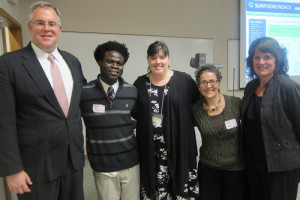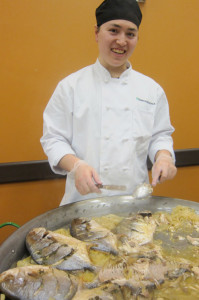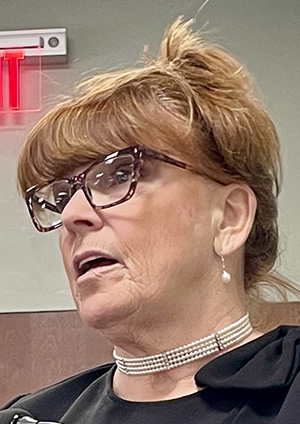By Cathy DeDe, Chronicle Managing Editor
Joseph Kaifala is a survivor, a gentle-voiced young man who grew up in Sierra Leone in east Africa amid what he calls the “madness” of a 10-year civil war, from the early 1990s to 2002.
It saw boys his age — some as young as six or seven years old — conscripted as child soldiers who became simultaneously perpetrators and victims of unspeakable violence, mayhem and deprivation.
He addressed approximately 60 boys from five local high schools — Glens Falls, Queensbury, South Glens Falls, Lake George and Hudson Falls — at SUNY Adirondack last Friday evening, Nov. 6, in a program, “Boys United for Peace in a Violent World.”
It was organized by the World Awareness Children’s Museum with support from Skidmore College and its International Relations program. Assemblyman Dan Stec also was on the panel.

Mr. Kaifala’s main topic was the civil war in his country, and the issues of child soldiers around the world — still a reality for what he described as tens of thousands of children under age 18 in the Mideast, Africa and beyond.
He shared more personal details in the Q&A, when the students asked unabashed questions about his own experiences.
Mr. Kaifala said that in his home country, young boy soldiers killed hundreds of people “before they’d even learned to spell their names, if they ever did.
“These child soldiers uncontrollably terrorized a nation priorly known for its peaceful nature. I grew up in that madness. For these children, killing had become like drinking water.”
He said he managed to avoid conscription, but that he and his father were jailed for what he believes was the better part of a year, starving, subject to torture or death at any minute — “before I was even old enough to comprehend war. I still can’t wrap my mind around it.”
His first experience of death? “I remember, when I was in the dungeon with my father, It was 4 a.m., I couldn’t sleep. A man who had been beaten, I couldn’t see, but he was crying with so much pain. I just stood against a wall. At 5 a.m., he stopped crying. He had died.”
He said that, weirdly, they were treated with some small deference in prison by rebel soldiers who recognized his father, a former teacher; their release was negotiated by a Catholic mission group.
Later, in an encounter with child soldiers who wanted to steal the coconuts he and his hungry brother had picked, he said he was saved by another rebel soldier, a former guard from their prison who felt some sort of bond after those many months.
“Always, you knew: Once they step back and cock that AK-47, you’re already dead,” Mr. Kaifala said. “But I was lucky.”
He repeated, “I am one of the lucky ones, for no specific reason. Every other kid I grew up with was killed or recruited. I always avoided conscription. I try not to think too hard about why I’m alive, and devote myself to peace instead.”
Mr. Kaifala spoke of the history of the country, of so-called Blood Diamonds and how the conflict was induced by economic instability, crumbling of the social contract, corruption and other forces. He described the civil war as “the revolt of all against all in the struggle for nothing.”
The result? At the war’s end in 2002, 50,000 people were dead; 27,000 forcibly amputated (literally, their hands, arms, egs cut off by machete), thousands of women raped; 500,000 people displaced.
Mr. Kaifala said, “The future of the country is in the hands of a people who never saw the inside of a classroom, former child soldiers who have never received any therapy who had been forced sometimes to kill their own families.”
Many survivors, the perpetrators of unspeakable violence, those former child soldiers are also victims themselves, he said.
He urged the young men listening — “You are not as powerless as you might think.” The most important thing, he said, is to exercise the right to vote, and “scream for those who cannot speak for themselves.”
Something may seem so simple, he said, but when he was a teenaged boy in a refugee camp, “if you could see my celebratory dance moves every time I received hand me down clothes from a Red Cross package, you’d think differently.”
He advised, “Leave it to those in need to decide the value of your small act of generosity.”
Mr. Kaifala received a scholarship to complete high school in Norway, then graduated from Skidmore in 2008 with degrees in International Relations, French, and Law & Society. He’s studying international law now — and he is a messenger for peace and awareness globally and personally.
He laughs over an incident in law school, when a fellow student marveled that he could be calm on the eve of a major exam. “We signed up for this,” he says he explained. “No matter how bad it is, it is not the equivalent of a kid waking up tomorrow in Baghdad.”
For a long time, Mr. Kaifala said, he didn’t speak about his experiences, in part for fear of being defined only by what he had lived through. Then, there was the day when a classmate “freaked out” when the cafeteria didn’t have what he described as her brand of “Philadelphia cheese.”
He says, “I thought I could quietly show them, the major crisis of the world is not whether there is Philadelphia cheese in the dining hall. From that moment, I decided that I have survived these horrible incidents, and I needed to use it to educate people. I gradually came to see myself as a sort of peace ambassador.”
Mr. Kaifale and colleagues have founded two organizations. The Memory Project records interviews with former child soldiers and residents of Sierra Leone who lived through the civil war, as a means, he said, of telling their stories, healing and perhaps moving forward.
He showed some interviews that included men and women unable to support themselves after losing their hands or arms to the soldiers. “What kind of a sleeve do you want,” Mr. Kaifala said the soldiers would famously ask before wielding the machete, “long or short?”
His other effort is the Jeneba Project, to build schools for boys and girls in his home country and eastern Africa.
Find more about Mr. Kaifala’s projects — or help his efforts — online at www.josephkaifala.com.
WACM ‘World’ Museum organized event
Heather Hickland, director of the World Awareness Children’s Museum, said the theme of the Nov. 6 event at SUNY Adirondack was the role of the military in the lives of boys around the world — how it can potentially be a positive, as Assemblyman and Navy veteran Dan Stec described, or destructive, as in the forced conscription of child soldiers in Sierra Leone and other war-torn militarized countries.
The evening started with a themed buffet dinner by SUNY Adirondack Culinary students and guest chef David Britton.
Inspired by Sierra Leone cuisine, the buffet included peanut soup, a gumbo-like rice dish, a Chicken Mombasa with curry spices, and “Poisson Braise,” pan-fried whole fish still on the bone. Many boys went back for seconds of what was likely pretty unfamiliar fare.

After dinner came nearly two hours of talks — intros by Mrs. Hickland and Skidmore professor Kate Graney, then keynote talks by Mr. Kaifala and Mr. Stec, followed by questions and answers with the audience. Finally, the boys broke into small discussion groups moderated by guest graduate students from Prof. Graney’s Ethnic Conflict, Gender and International Relations program at Skidmore.
Funding for the program came from State Senator Betty Little’s campaign fund. She was there for the dinner and said she had offered campaign funds to support the program organized by her daughter Elizabeth Little Hogan last year, when the museum had trouble finding a grant to support the inaugural program. “A lot of kids got a lot out of it,” Sen. Little said, “so I’m funding this one and the next year as well.”
Mrs. Hickland says of WACM’s role, “Childhood doesn’t end at age 11, when they’re done with our museum’s physical, interactive space. The need to understand the world and connect also doesn’t end — in fact, it’s almost more important.”
She said this separate line of programming includes a student docent program called CITY and these now-annual single-gender high school programs, alternating years between boys and girls.
WACM board member Elizabeth Little Hogan generated the initiative. She had borrowed the museum’s burka for the Girls Day program at Glens Falls High School, where they screened a movie on issues of girls’ education around the world.
“She thought there was something the museum could do with this,” Mrs. Hickland recalls, “and it evolved from there.”
Prof. Graney told the students, “As a professor of international relations, I’m talking about depressing stuff all the time, nuclear weapons, Russia.
“Tonight you will hear some tough stuff. I don’t want you to feel bad, but instead, to think how you might want to respond, now that you know this about your world.
“For young men, I think it’s really tricky, facing violence in a violent world. You can’t win: You’re accused of being not violent enough, or of being too violent.
“It’s hard to find the balance…Both domestically and around the world, it’s a pretty challenging moment to be a young male person facing the world.”
She said that when Mr. Kaifala came to Skidmore in 2004, “he had just lived through a pretty horrific experience, yet he was one of the smartest, gentlest, kindest and most determined people, to have come out of that place. It’s a testament that violence doesn’t always have to lead to violence.”
Copyright © 2015 Lone Oak Publishing Co., Inc. All Rights Reserved.
 Glens Falls Chronicle Serving the Glens Falls/Lake George region; Warren, Washington and northern Saratoga counties since 1980
Glens Falls Chronicle Serving the Glens Falls/Lake George region; Warren, Washington and northern Saratoga counties since 1980


